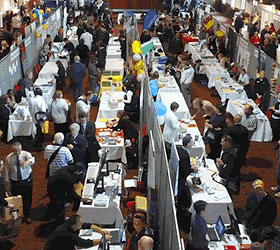
There is an old joke of sorts that defines recession as an economic period when your neighbor is out of work, and a depression as an economic period when you are out of work. The point of that is that for someone looking for a job the economy is never great. This is why persistence is so important for your job search. Without it, even in a great economy, you aren’t going to have much luck.
As an example; a young woman I know was looking for a job. She had been an intern at a company that wasn’t hiring, but she sent them a copy of her resume anyway and requested that it be kept on file. She called and checked on new positions every other week but the company had tightened up due to the economy. After 6 months of this, she went and placed her updated resume on file. The head of the department remembered her and they were chatting about some of the changes that had taken place in the year since she had been an intern. The young woman drove the three hours home. Guess what? There was a job offer from the company waiting for her on her answering machine. The head of the department admired her persistence in keeping after what she wanted.
This is a real world example of getting what you want by going after it. When a company isn’t hiring, politely request that they keep your resume on file and be sure to ask how long it will be kept. Then send another one. Visit the company, network with those who work there. Because many companies prefer to hire from within, consider taking any position that opens up with that business. Persistence is often the difference between a job and a career. It’s also often the difference between being employed and being unemployed.
Job Hunting and Taxes
Job SearchComputer Use at Work: What Not to Do
Career & WorkplaceCover Letter Tone: Formal or Friendly?
Cover Letters

When creating cover letters, a common mistake is to essentially use the same letter every time. Many applicants change nothing more than the name of the company. This is a bad idea and you can be certain that your generic letter is seen as such by those who read it. The other common mistake is in tone. As a general rule, formal is better. But this is not always the case, though it is a safe fall back position.
I’m going to assume you have done your homework and know enough about the job you are seeking to be specific in your cover letter. If you don’t have that information, then get it before you begin writing. You cannot craft a decent cover letter without specifics.
The tone of the letter will be dictated on the position you are seeking. The rule is that the more authority the position has then the more formal the cover letter should be and the more specific. You want the letter to be brief but complete. It’s important to highlight your skills in relation to the specific job being offered and to explain why you are perfectly suited to the position.
Of course you will address the letter to the person doing the interviewing. If you don’t know who this is, then just call and ask. Address him or her formally throughout your letter. Never shorten someone’s name unless given permission to do so. Save the informal and friendly approach for your friends.
When writing a cover letter you want to get your point across as briefly as possible while showing respect to the reader. The tone should always err on the side of formality.
Should You Update Your Resume?
Executive ResumesProfessional ResumesResume KeywordsResume WritingResumes

One frequent question I hear from my clients (even those who are happy in their jobs) is, “How often should I update my resume, or should I?” After all, they aren’t looking for a new job and are happy where they are in their careers. This is a stumbling block that people need to get over quickly; you should always have an updated resume.
From a practical standpoint, are you really completely content to remain in exactly the same position you are currently in for the rest of your career? Even movement within the same company can often come with a request for an updated resume. And isn’t movement the whole point? Keeping your resume updated for such occasions makes sense… especially if you are on a senior or executive track. Plus, you have most likely learned new skills, taken a few new classes or seminars, tucked some new accomplishments under your belt, and/or just generally changed since you took the position you are currently in, so your resume should reflect that.
There is also the reality of economics to consider. Companies shift focus, change and develop over time. People lose jobs and move on to other careers. All of these factors mean that you will likely be hunting for another job some time in the course of your career. Having a resume ready to go will allow you to quickly find a new job. It’s also far easier to keep a resume updated than to start over and try to fill in the missing pieces.
Keeping your resume updated makes sense, and is a practical way of handling your career. You will always be ready to hand over a current copy when the opportunity presents itself.


Networking is an absolute must for a successful career. Unfortunately, many people consider networking events as nothing more than social time akin to a cocktail party. The truth is that networking events are more like a pre-interview on a mass scale. You are on display and you ensure that your goals, value, and expertise are communicated effectively.
One of the most basic mistakes is that people tend to dress down for these networking events. While you don’t necessarily have to dress for an interview, dressing well conveys respect for others as well as for yourself. Besides, every psychological study ever done shows that when people dress they are apt to have more confidence. So put on your best business casual attire and and head to the gathering.
Another mistake people make is not having business cards ready to hand out. Sure, you can use a digital card on your phone and send it to them. But that only works if their phone has that capability and that they know how to use the application. While it may be old school, it is still easier to hand a business card over. Even better, ask which the employer/recruiter would prefer-digital or card in hand. This way they know that you are current with the latest technology, yet still understand the traditional niceties.
Be certain that you observe proper etiquette when at a networking event. The purpose of these events is to mingle and meet as many people as possible. To do this you need to be confident but not pompous. Make certain that you don’t monopolize any one company and be sure to be respectful of everyone you meet. You never know when or where your paths may cross again.
Finally, never stop making contacts in your field. You need these people not only to stay up on current trends, but you may one day need a reference, a new job or even a contact if your company is looking to expand into a new market. It never hurts to plan ahead.
What NOT to Include on Your Resume
InterviewingJob SearchProfessional ResumesResume KeywordsResume Writing

Your resume is valuable real estate. It needs to be kept as brief as possible while highlighting your past employment and skills in the best possible light. Therefore, it’s important to include the best of the best on your resume.
While it’s important to include as much positive information as possible, it is equally important to know what NOT to include on your resume. Because your resume is one of the most valuable marketing tools in your job search, you want to ensure that you are including information that is relevant to your career goals, and removing anything that does support those goals.
References
Don’t include the line “references available upon request.” It’s completely pointless and a waste of space. Both you and the hiring managers know that you are going to produce references simply because in 99 out of 100 cases they will be required. Just be sure that you have a reference page, formatted to match your resume, ready to hand over at the interview.
Generic Statements
Statements such as “highly skilled,” “reliable,” or “energetic team player” are generic and really don’t put you in a positive light. If anything, they show you as someone who hasn’t really considered the alternative. If you have been doing anything at all, then you have skills. Show what you have done with those skills instead of using a phrase that means nothing. “Energetic team player”? What else is there, a lethargic loner? Being energetic and a team player are expected work traits and shouldn’t be highlighted on your resume. It strikes a hiring manager as trying to fill blank space on the page. The same is true of “reliable.” If you aren’t reliable, then you will not last long.
Writing a great resume isn’t difficult if you create a document that matches the needs of the employer, as well as effectively communicates your skills and expertise. Look at your resume the way an employer would and update it accordingly.
You own the space and you need to make it work for you, and your job search.
